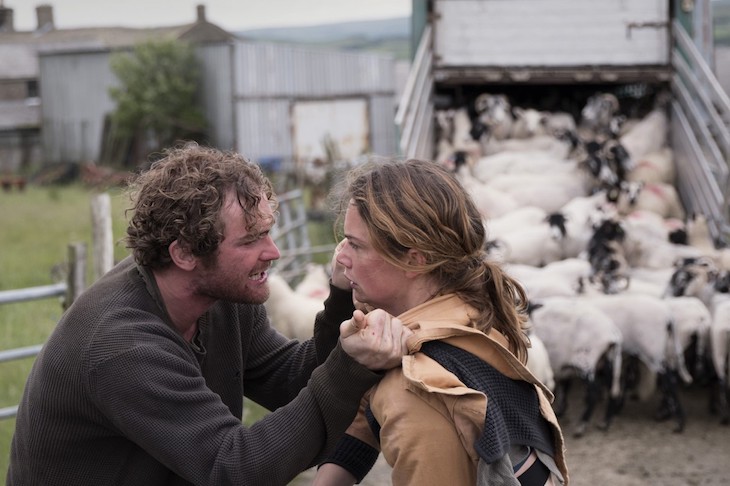Dark River is the much-anticipated third feature from British writer/director Clio Barnard and it is one of those bleak, rural- England dramas featuring cement-coloured skies, wind, rain, mud, rusted old farm machinery and dead animals — do people who move out from the city know what they are letting themselves in for? — as well as the aftermath of childhood sexual abuse. (Should we pull them aside and have a word?) Apologies for sounding glib about such a heavy subject but this is, ultimately, so heavy-handed about that heavy subject it left me cold. I should point out, however, that other critics are available, and some are saying it is ‘powerful’ and ‘affecting’. So you pays your money and takes your pick.
Whereas Barnard’s two previous films — The Arbor and The Selfish Giant — were both terrific, and social-realist tours de force, this feels laboured from the off. Loosely inspired by Rose Tremain’s Trespass, and with the title taken from a Ted Hughes poem about grief and memory, it opens with Alice (Ruth Wilson), a sheep shearer, returning to her childhood home, a Yorkshire farm, following her father’s death. She believes he had promised the tenancy to her, and she is determined to claim her inheritance. As she drives though the hills, P.J. Harvey sings the deeply melancholic folk song ‘My Father Left Me an Acre of Land’ so we know that her arrival, after a 15-year absence, is not going to be greeted by a party, bunting, balloons and banners reading: ‘Welcome home Alice!’ (I wish!) Instead, she discovers that the farm has, yes, gone to ruin. Beneath that cement sky, she discovers not just the rusted old machinery and the mud but also a rat infestation and a sheep with a broken leg that needs to be shot and peeling paint and holes in the walls and broken fences and neglected fields. And, on top of all that, there’s her brother Joe (Mark Stanley).
Joe is not about to give up the tenancy and Joe is violently angry. Their father, he tells her, did not die without suffering. He asked for you. Why weren’t you here? We know why, just as we know why she won’t go upstairs to her childhood bedroom. We know because, in the frequent flashbacks, she sees her father abusing her in that bedroom — not in detail, but we get the gist — and she sees him coming down those stairs, and because she sees it, then we see it. The father is played by a near-silent Sean Bean and his presence not only feels like a surprisingly cheap and clumsy stunt, but also denies the narrative the complexity and nuance that, to my mind, it would have to have if we were going to use words like ‘powerful’ and ‘affecting’.
As with all great actors, Wilson can brilliantly communicate an interior life, but that seems wasted here, as so much is externalised, with not just the flashbacks of abuse but also the flashbacks to cheerier times when Joe and Alice were innocent kids. The direction is extraordinarily linear. It is: Alice feels this because of this, which we are now going to cut away to, in case you otherwise won’t get it. Barnard might as well have drawn arrows in a big marker pen all over it. And, consequently, it is plodding rather than slowly revelatory — we know everything we need to know within the first ten minutes — and there is little actual drama. You do, admittedly, expect little actual drama in films such as this, but here you keenly feel the lack. As both know the truth about their father, but refuse to address it, most of the action is centred on a brother and sister circling each other, eyeing each other, and rowing viciously. As Sean Bean hovers. Beneath a cement sky.
There are occasional fine, touching moments — as when Joe talks Alice through the wild flowers in the neglected field — but, for the most part, it’s as heavy-going as it is heavy-handed and some aspects are plain odd. For example, Alice is not a girly girl. Alice can heave sheep and kill rabbits and wears farm clothes and has only one prized possession (her shearing tool) but she always seems to be in full make-up? I was puzzled, I admit. And as for the ending, it’s explosive, but muddled. Still, there are other critics. But I know who I trust.






Comments